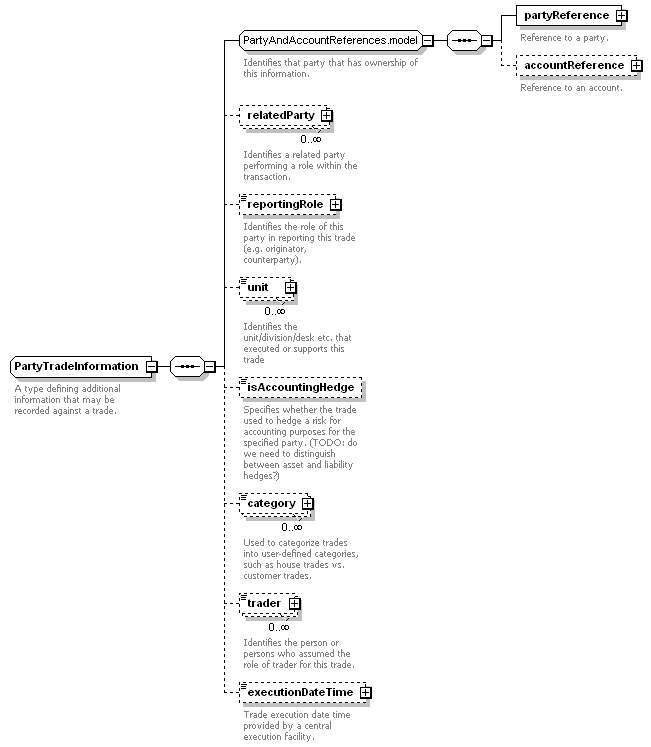
Namespace: |
|
Content: |
complex, 9 elements |
Defined: |
globally in fpml-doc-5-2.xsd; see XML source |
Includes: |
definitions of 7 elements |
Used: |
at 2 locations |

XML Representation Summary |
|||||
| <...> | |||||
|
|||||
| </...> | |||||
| partyTradeInformation (in tradeHeader), | partyTradeInformation (in tradeReferenceInformation) |
| <xsd:complexType name="PartyTradeInformation"> <xsd:sequence> <!-- RPTWG 2009-09-04 begin--> <!-- RPTWG 2009-09-04 end --> <!--- the following elements were removed from 5.2 because CFTC/SEC reporting requirements were removed from 5.2 <xsd:element name="timestamps" type="TradeProcessingTimestamps" minOccurs="0"> <xsd:annotation> <xsd:documentation xml:lang="en">Allows timing information about a trade to be recorded.</xsd:documentation> </xsd:annotation> </xsd:element> <xsd:element name="cleared" type="xsd:boolean" minOccurs="0" > <xsd:annotation> <xsd:documentation xml:lang="en">Specifies whether the trade is anticipated to be cleared via a derivative clearing organization</xsd:documentation> <xsd:appinfo> <view:override view="transparency" minOccurs="1"/> <view:override view="recordkeeping" minOccurs="1"/> </xsd:appinfo> </xsd:annotation> </xsd:element> <xsd:element name="endUserException" type="xsd:boolean" minOccurs="0" > <xsd:annotation> <xsd:documentation xml:lang="en">Specifies whether the trade is not obligated to be cleared via a derivative clearing organization because the "End User Exception" was invoked.</xsd:documentation> </xsd:annotation> </xsd:element> <xsd:element name="nonStandardTerms" type="xsd:boolean" minOccurs="0" > <xsd:annotation> <xsd:documentation xml:lang="en">Specifies whether the trade contains terms that affect pricing that are not represented by the standard reportable data fields, that is, it indicates a bespoke trade that might otherwise appear from its characteristics to be a standardized trade but is really non-standard. The flag indicates that the price for this trade is not to be construed as being indicative of the market. </xsd:documentation> <xsd:appinfo> <view:override view="transparency" minOccurs="1"/> </xsd:appinfo> </xsd:annotation> </xsd:element> <xsd:element name="offMarketPrice" type="xsd:boolean" minOccurs="0" > <xsd:annotation> <xsd:documentation xml:lang="en">Indicates that the price does not reflect the current market. For example, in a credit trade where the two counterparties are not of equal credit standing, there is no initial margin and one party pays collateral to the other in the form of an add-on to the price (say a price that would otherwise be 100 at the market is struck at 105 to include the collateral, resulting in a very off-market looking price.)</xsd:documentation> <xsd:appinfo> <view:override view="transparency" minOccurs="1"/> </xsd:appinfo> </xsd:annotation> </xsd:element> <xsd:element name="largeSizeTrade" type="xsd:boolean" minOccurs="0" > <xsd:annotation> <xsd:documentation xml:lang="en">Specifies whether the sender of this trade considers it to be a large notional trade or block trade for reporting purposes, and thus eligible for delayed public reporting.</xsd:documentation> </xsd:annotation> </xsd:element> <xsd:element name="executionType" type="ExecutionType" minOccurs="0"> <xsd:annotation> <xsd:documentation xml:lang="en">Used to describe how the trade was executed, e.g. via voice or electronically.</xsd:documentation> <xsd:appinfo> <view:override view="transparency" minOccurs="1"/> <view:override view="recordkeeping" minOccurs="1"/> </xsd:appinfo> </xsd:annotation> </xsd:element> <xsd:element name="executionVenueType" type="ExecutionVenueType" minOccurs="0"> <xsd:annotation> <xsd:documentation xml:lang="en">Used to describe the type of venue where trade was executed, e.g via an execution facility or privately.</xsd:documentation> <xsd:appinfo> <view:override view="transparency" minOccurs="1"/> </xsd:appinfo> </xsd:annotation> </xsd:element> <xsd:element name="confirmationType" type="ExecutionType" minOccurs="0"> <xsd:annotation> <xsd:documentation xml:lang="en">Used to describe how the trade was confirmed, e.g via a confirmation facility, via private electronic service, or via written documentation.</xsd:documentation> <xsd:appinfo> <view:override view="recordkeeping" minOccurs="1"/> </xsd:appinfo> </xsd:annotation> </xsd:element> <xsd:element name="counterpartyTypes" type="CounterpartyTypes" minOccurs="0"> <xsd:annotation> <xsd:documentation xml:lang="en">Used to identify whether this trades involves swaps dealers, major swaps participants, or other types of organizations.</xsd:documentation> <xsd:appinfo> <view:override view="recordkeeping" minOccurs="1"/> <view:override view="recordkeeping" minOccurs="1"/> </xsd:appinfo> </xsd:annotation> </xsd:element> --> <!-- <xsd:element name="regulator" type="Regulator" minOccurs="0" maxOccurs="unbounded"> <xsd:annotation> <xsd:documentation xml:lang="en">Used to identify the regulator(s) responsible for monitoring this transaction.</xsd:documentation> <xsd:appinfo> <view:override view="recordkeeping" minOccurs="1"/> <view:override view="transparency" minOccurs="1"/> </xsd:appinfo> </xsd:annotation> </xsd:element> --> </xsd:sequence> </xsd:complexType> |
Type: |
TradeCategory, simple content |
| xsd:normalizedString |
maxLength: |
255 |
| <xsd:element maxOccurs="unbounded" minOccurs="0" name="category" type="TradeCategory"/> |
Type: |
ExecutionDateTime, simple content |
| xsd:dateTime |
| <xsd:element minOccurs="0" name="executionDateTime" type="ExecutionDateTime"/> |
Type: |
xsd:boolean, predefined, simple content |
| <xsd:element minOccurs="0" name="isAccountingHedge" type="xsd:boolean"/> |
Type: |
RelatedParty, complex content |
| <xsd:element maxOccurs="unbounded" minOccurs="0" name="relatedParty" type="RelatedParty"/> |
Type: |
ReportingRole, simple content |
| xsd:normalizedString |
maxLength: |
255 |
| <xsd:element minOccurs="0" name="reportingRole" type="ReportingRole"/> |
Type: |
Trader, simple content |
| xsd:normalizedString |
maxLength: |
255 |
Type: |
Unit, simple content |
| xsd:normalizedString |
maxLength: |
255 |
| XML schema documentation generated with DocFlex/XML 1.8.6b2 using DocFlex/XML XSDDoc 2.5.1 template set. All content model diagrams generated by Altova XMLSpy via DocFlex/XML XMLSpy Integration. |